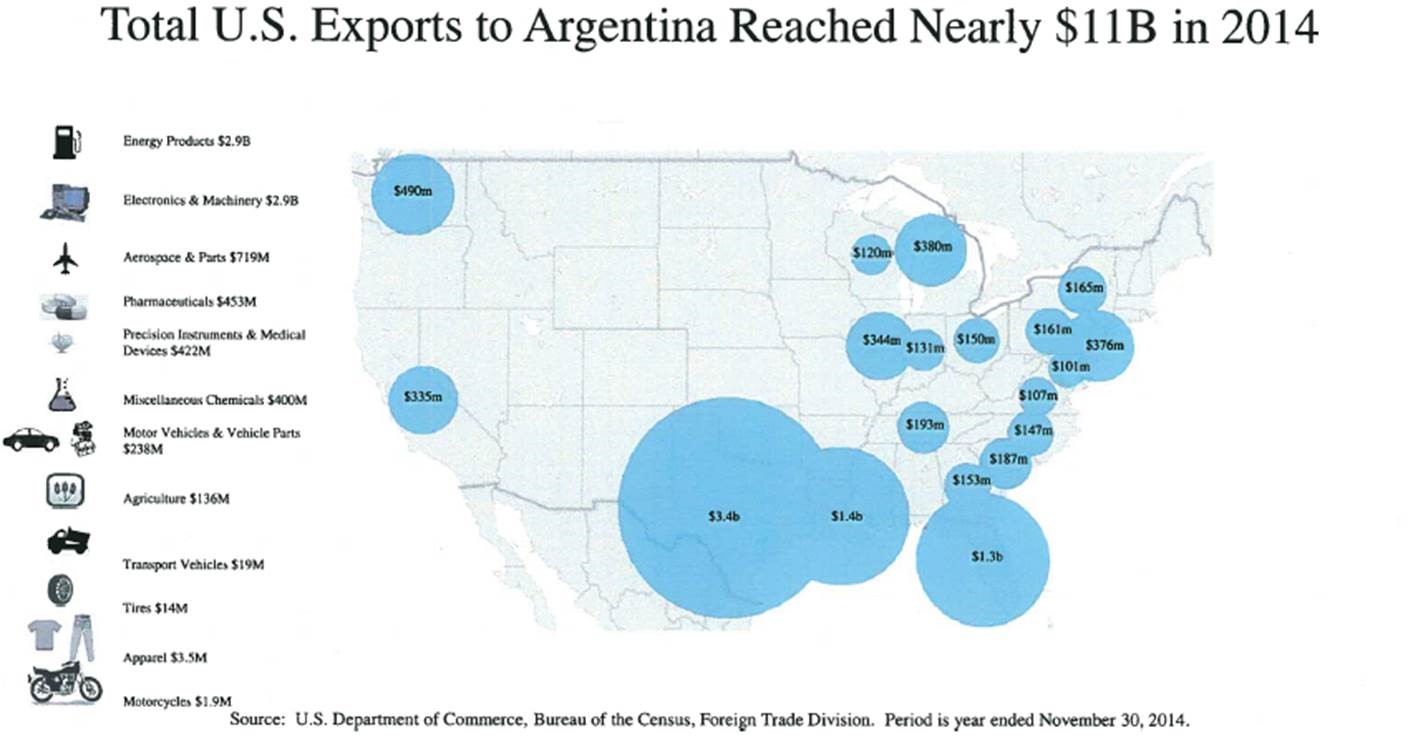Washington, D.C. – United States Trade Representative Michael Froman announced today that the World Trade Organization (WTO) Appellate Body found in favor of the United States in a dispute challenging widespread restrictions maintained by Argentina on the importation of U.S. goods. The Appellate Body affirmed an earlier WTO panel report agreeing with the United States that Argentina’s import licensing requirement and other import restrictions breach international trade rules.
“The United States welcomes the WTO’s findings in this dispute. This is a great win for the United States,”said Ambassador Froman. “Argentina’s protectionist measures impact a broad segment of U.S. exports, potentially affecting billions of dollars in U.S. exports each year that support high-quality, middle class American jobs. This case demonstrates the Obama Administration’s unwavering commitment to enforce our trade rights and to fight for the interests of American workers, businesses, and farmers. We will continue to work tirelessly to ensure that our trading partners play by the rules. Since 2009, this Administration has brought 18 enforcement actions in the WTO, and we have won every one decided so far.”
The import restrictions challenged by the United States in this dispute include an import licensing requirement (theDeclaración Jurada Anticipada de Importación or “DJAI”) that applies to all imports of goods into Argentina. The United States also challenged restrictive trade-related requirements imposed by Argentina together with the DJAI and other licensing requirements.
Both the DJAI and the restrictive trade-related requirements serve unfairly to restrict the importation of U.S. goods into Argentina. The measures potentially affect billions of dollars in U.S. exports each year. Key U.S. exports to Argentina include energy products, electronics and machinery, aerospace and parts, pharmaceuticals, precision instruments and medical devices, miscellaneous chemicals, motor vehicles and vehicle parts, and agricultural products.

This is the fourth significant WTO victory USTR has announced in the past year. Previous WTO victories announced since summer 2013 include:
- In June, the WTO found that China breached WTO rules by imposing unjustified extra duties on American cars and SUVs. In 2013, an estimated $5.1 billion of U.S. auto exports were covered by those duties.
- In August, the WTO found that China breached WTO rules by imposing duties and quotas on exports of rare earths, tungsten, and molybdenum. Those export restraints promote China’s own industry and discriminate against U.S. companies using those materials, which are key inputs by critical American manufacturing sectors, including hybrid car batteries, wind turbines, energy-efficient lighting, steel, advanced electronics, automobiles, petroleum, and chemicals.
- In October, a WTO panel found in favor of the United States in a dispute challenging India’s ban on various U.S. agricultural products – such as poultry meat, eggs, and live pigs – allegedly to protect against avian influenza. The panel agreed with the United States that India’s ban breached numerous international trade rules, including because it was imposed without sufficient scientific evidence. This panel report will be adopted by the WTO or appealed by January 26, 2015.
Background:
In 2012, the United States initiated this dispute, in cooperation with the European Union (EU) and Japan, by requesting consultations with Argentina concerning its import licensing requirements as well as restrictive trade-related requirements imposed together with those licensing requirements. After consultations failed to resolve the matter, the WTO established a single panel to consider the U.S. complaint as well as similar complaints filed by the European Union and Japan.
With respect to the DJAI requirement, the Appellate Body upheld the Panel’s findings that this requirement constitutes a restriction on the importation of goods and is therefore inconsistent with Article XI:1 of the General Agreement on Tariffs and Trade 1994 (GATT 1994). The Appellate Body rejected Argentina’s appeal that the Panel erred in interpreting Article XI:1 and instead found that Argentina had not established any error by the Panel in finding that the DJAI requirement has a limiting effect on imports. The Panel had found that the DJAI requirement restricts market access for imported products, creates uncertainty as to whether importation will be allowed, does not allow companies to import as much as they desire, and imposes a significant burden on importation.
The Appellate Body also upheld the Panel’s finding that the restrictive trade-related requirements are inconsistent with Article XI:1 of the GATT 1994 as restrictions on the importation of goods. The Panel had found these requirements impose conditions on importation that have a limiting effect on imports and are characterized by a lack of transparency and predictability, which further discourages importation. The restrictive trade-related requirements include: (1) the requirement to export a certain value of goods from Argentina related to the value of imports; (2) the requirement to limit the volume of imports and/or reduce their price; (3) the requirement to refrain from repatriating funds from Argentina to another country; (4) the requirement to make or increase investments in Argentina (including in production facilities); or (5) to incorporate local content into domestically produced goods. The Appellate Body rejected Argentina’s appeals that the complainants’ panel requests had not identified a single restrictive trade-related requirements measure and that complainants had not proven the existence of that measure.
The United States exported nearly $11 billion in goods to Argentina for the year ending November 30, 2014. The following U.S. states represented the largest share of exports to Argentina in that year, each exporting over $100 million in goods that year: Texas, Louisiana, Florida, Washington, Michigan, New Jersey, Illinois, California, Tennessee, South Carolina, New York, Pennsylvania, Georgia, Ohio, North Carolina, Indiana, Wisconsin, Virginia, and Maryland. Top exports included energy products, electronics and machinery, aerospace and parts, pharmaceuticals, precision instruments and medical devices, miscellaneous chemicals, motor vehicles and vehicle parts, and agricultural products.
Under WTO rules, the panel and appellate reports will be adopted by the WTO within 30 days circulation at the request of any party to the dispute.







